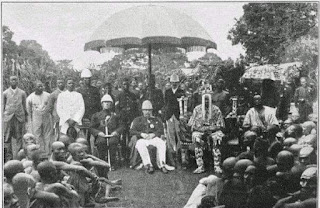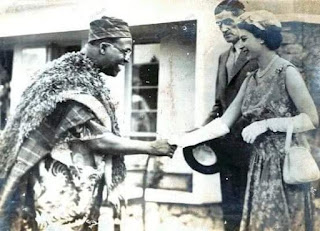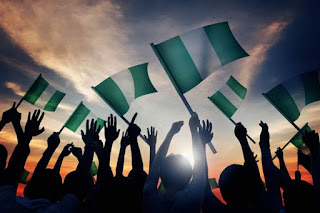This article is the complete history of Nigeria. It centres on the Country's biography, pre-colonialism, colonialism, independence, republic, ethnic groups, and political setting
History of Nigeria's Independence day:
Independence day in Nigeria is a day to commemorate the freedom, but partial freedom of Nigeria from the powerful hands of colonialism.
Before we go further, be informed that the day is always a free day as the Federal Government declares such day as a work-free day.
Independence Day is celebrated in Nigeria, at every First of October, yearly. Should the day fall on weekends- i.e Saturday/Sunday, the Federal Government, through the office of the Interior Minister shall shift the Public Holiday to the following working day- Monday.
Take for instance, the 2022 Independence day falls on Saturday, 1, 2022, the Federal government, through the Interior Minister- Ogbeni Rauf Aregbesola declared Monday as public holiday for Nigerians to mark the Independence day.
Daily News Report's Editor-In-Chief, takes you through the scenarios and FAQs surrounding Pre and post Independence of Nigeria
What does The 1960 Independence day Signify in Nigeria?
Nigeria got her Independence in 1960 and thus celebrate it yearly on October 1. The 1960 independence celebrates the Country’s Independence from British rule which occurred in 1960. Though, the 1960 Independence only gained partial freedom to Nigerians because Queen Elizabeth II was still the head of Government then, while She controls Nigeria with a Prime Minister- Sir Abubakar Tafawa Balewa.
It was the 1963 Republic that gave Nigeria total Independence from the power of the British government. This era marks the original freedom, as Nigerians now gained total dominance of their Country and territory, that was when Nigeria started running Presidential system of Government. The first Executive President of Nigeria was Dr. Nnamdi Azikiwe.
What is the meaning of Independence day | What Happens On Independence Day?
The government of Nigeria celebrates this holiday annually. The President’s address to the public marks the beginning of the festivities, this is broadcasted LIVE on Radios and Television Nationwide, anchored by the NIgerian Television Authority (NTA). Among what the President will say is to felicitate with Nigerians on the day and give updates on the current situations and positions of the Country.
The Nigerian Armed Forces, the Nigeria Police Force, the Ministry of Foreign Affairs, the workforce, national education services and all parastals do celebrate this day with the Public (Nigerians). Offices, Schools and markets will close on this day and the citizens take to the street or stadium, dressed in green and white to celebrate. The President is moved to Eagle's Square to open the Celebration as military officers, workers and Students engage in parades and matchpast. This process also happes across the Thirsty-Six States of the Federation.
This is the History of Nigeria's Independence Day:
The birth of Nigeria came from the 1914 amalgamation by Sir. Lord Lugard, where Southern Protectorate (South and Lagos colony) was merged with the Northern Nigeria Protectorate in 1914 to create the Colony and Protectorate of Nigeria.
 |
British Authorities sitting with A Monarch and Nigerians during the colonial Era. Image credit: Getty Image |
This is the British Colonial style | How it looses in Africa:
After the merger, In 1950, the British Empire begins to lose its power grip over Africa as many territories in Africa were calling for independence already. In 1956, Anthony Enahoro called for the self Independence of Nigeria from the British government, though the North rejected it and this led to various arguments.
With the agitations and awareness from Nigerians' top Nationalist- Sir Herbert Marculay, and others llike Dr. Azikiwe, Chief Obafemi Awolowo, Sir Ahmadu Bello and others, coupled with the help of newspaper and elites in Nigeria and diasporas, The Brirish Government agreed and granted Independence to Nigeria on October 1, 1960, thus becoming the Federation of Nigeria.
 |
First Premier of the Western Region- Chief Obafemi Awolowo having a handshake with Queen Elizabeth II, during her visit to Nigeria. Image credit: Getty Image
|
Upon getting Independence, a new constitution was established with an elected prime minister and a ceremonial head of state. Dr. Nnamdi Azikiwe, who was previously the Governor-General was the first President. Sir Abubakar Tafawa Balewa continued to serve as the prime minister, a position he had held since 1957.
In the quest to gain full autonomy, on June 1961, the Northern part of the Trust Territory of the Cameroons joined the Northern region of Nigeria and in October, the Southern Cameroons united with the Republic of Cameroon to form the Federal Republic of Cameroon. Also, On October 1, 1963, Nigeria became a republic as a sovereign State, with Dr. Azikiwe as President of the Country.
Sequence Of Nigeria Independence Story:
In 1850s, the British Government establish their presence in Lagos, making Lagos the crown colony, where the British resides.
What led to British arrival into Nigeria?
The era was during an industrial revolution in Europe, so in the quest for resources and manpower, the British stumbled on Africa.
Colonialism | Colonialism Book | Queen Elizabeth II
What are the roles Queen Elizabeth II played in the Colonization of Nigeria?
Queen Elizabeth II was the British Monarch then and as Britain colonized Africa, she is definitely part of those giving instructions to the Colonial Masters on what to do.
After the Queen Elizabeth II death, there seem to be this harsh tone coming from Citizens in the African Countries. Records show that the Britain "stole" so much resources from the colonized African Countries, engaged them into slavery, while many Africans died during the course.
Definition of Slavery | Slavery abolish | Africa slavery:
Does slavery start from the British government?
Historical facts surfaced that African Kings, Queens and elites were already engaging in slavery of their people before the advent of the British Government. What played out there was that the British took advantage of what they met (slavery), bribed the African leaders and make use of them to rule their subjects through what is called "indirect rule". After Queen Elizabeth II death, there are calls for Britain to return "Stolen" Gems, Diamonds and other resources back to the real owners.
 |
Queen Elizabeth II was born in London, 21st April, 1926 and her death was announced by Backingham Palace on Thursday, September 8, 2022. Credit: BBC News |
The amalgamation of Nigeria:
1861—1914: The Colony and Protectorate of Nigeria was done.
October 1, 1960 marks the official Independance which was granted to Nigeria, as Journalist Flora Shaw suggested the name- Nigeria, which was coined due to the Country's nearness to River Niger.
Here are quick historical facts about Nigeria:
Seventh-most populous Country in the World, with more than 200 million people.
The population is divided to roughly 250 ethnic groups, while religion is divided into three: Christian, Muslims and African Traditional Religion.
This is the Demography of Nigeria | This is the current estimatesd Population growth in Nigeria:
Nigeria is located in the West Africa, alongside Ghana, Senegal, and co. The population of Nigeria is over 200 Million, and predicted to grow more higher than China in coming years.
This is the Language in Nigeria | Lingua franca in Nigeria:
English Language is the official language of Nigeria, with many other dialects accounting to over 520 Languages; majorly grouped into three:
Colour code of Nigeria flag;
Green and White is NIgeria's colour code.
What are the Importance of Independence Day in Nigeria:
The Nigeria Independence day is so important and unique because it marks the beginning of an era.




